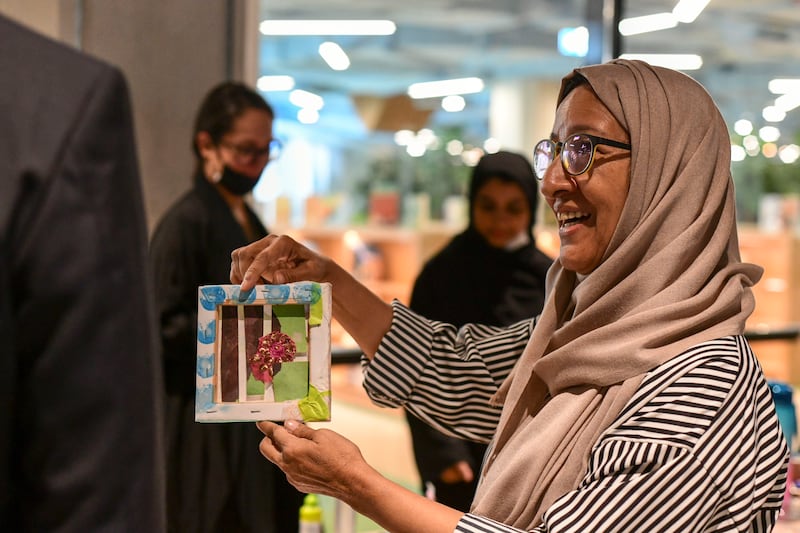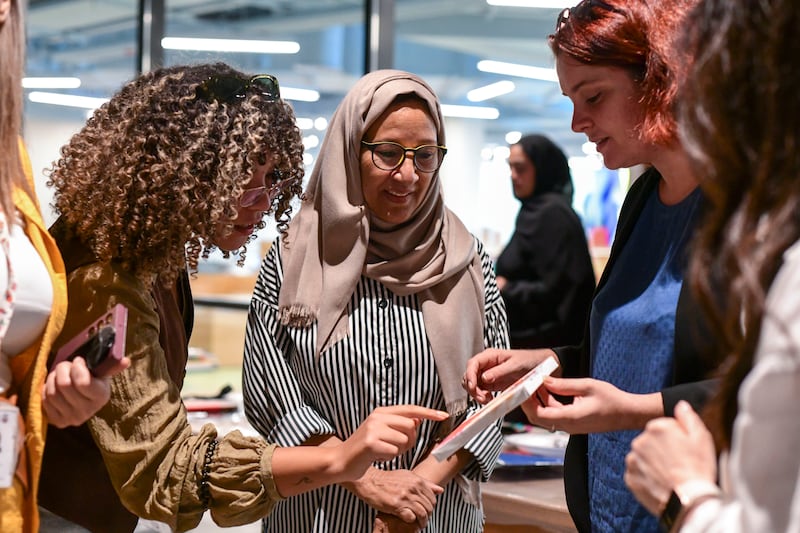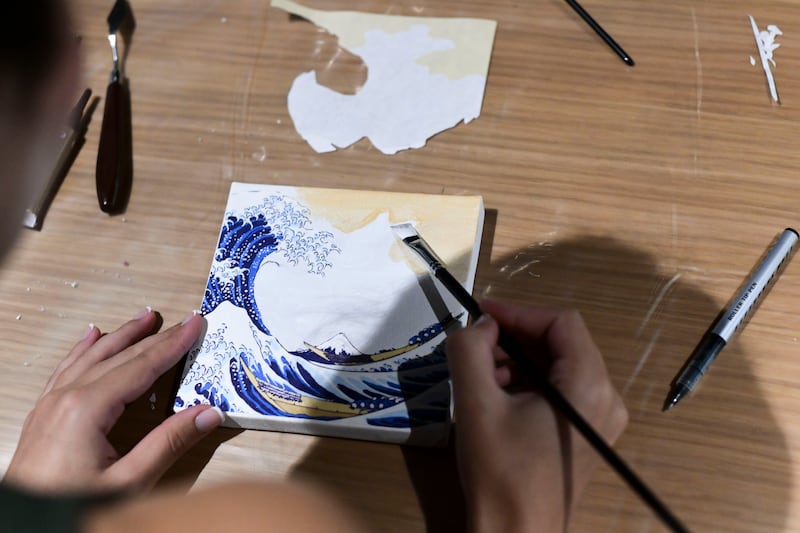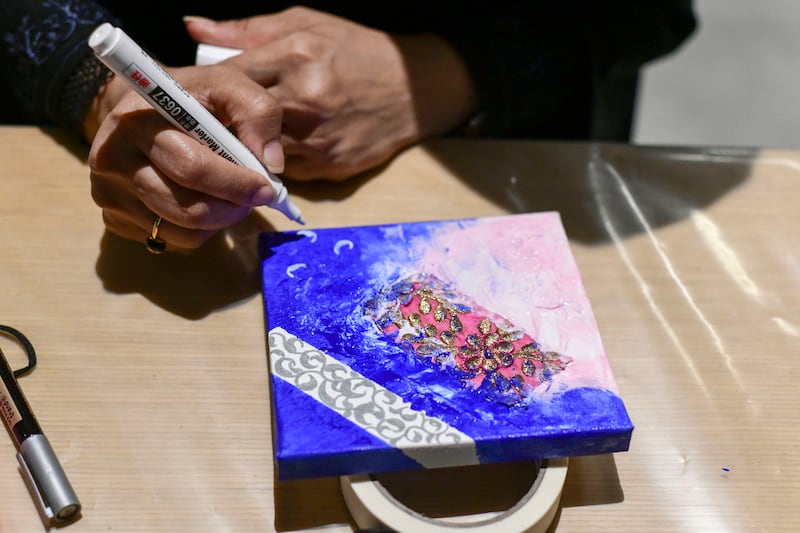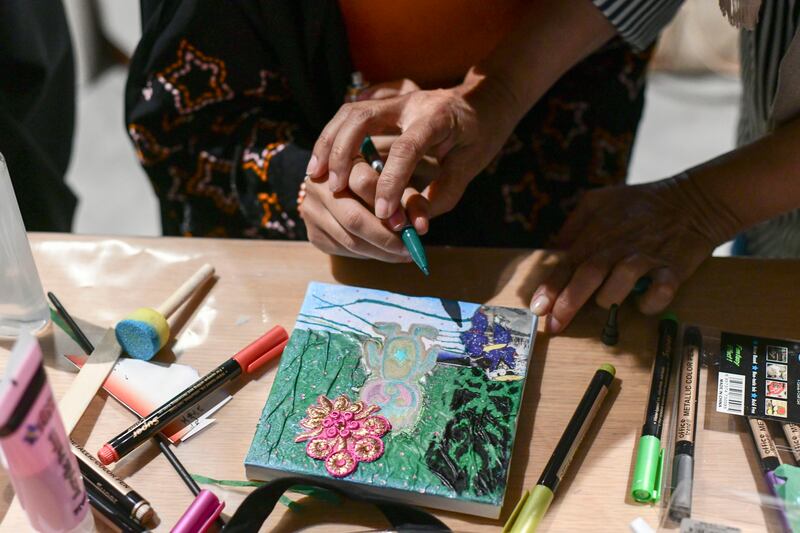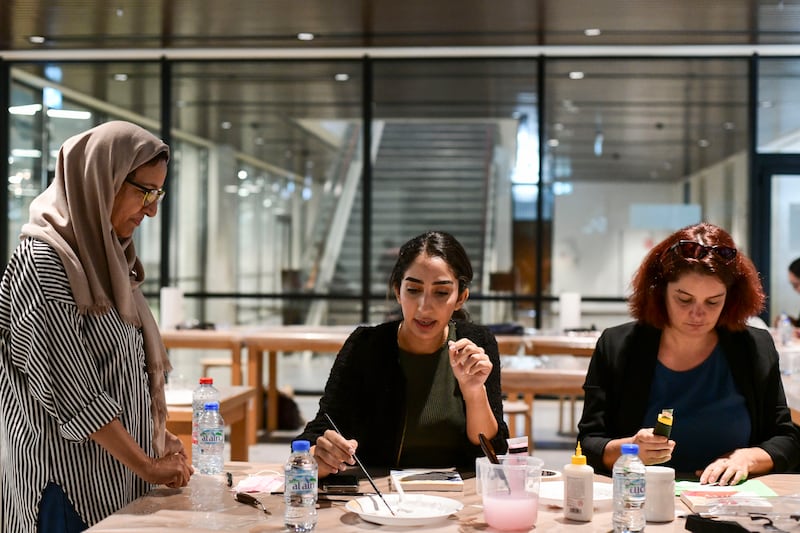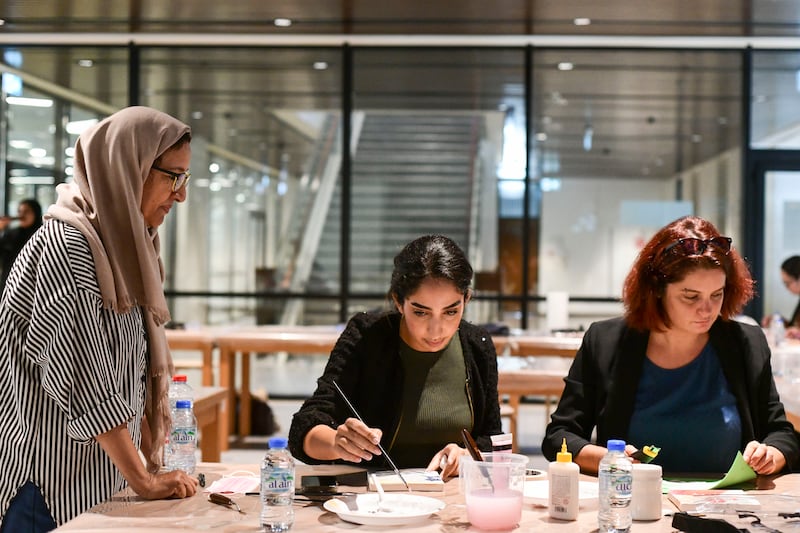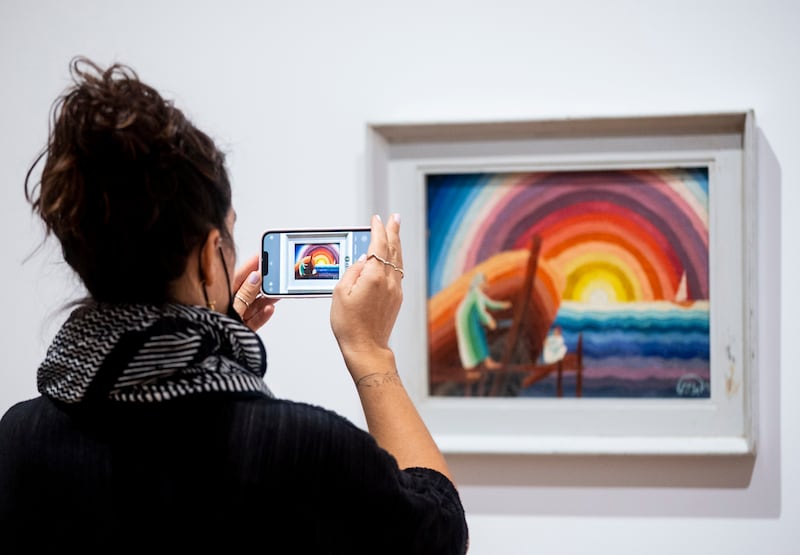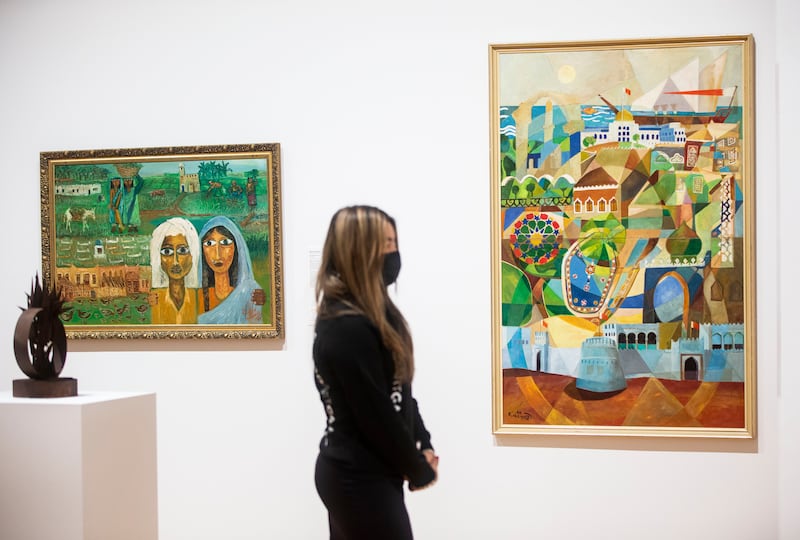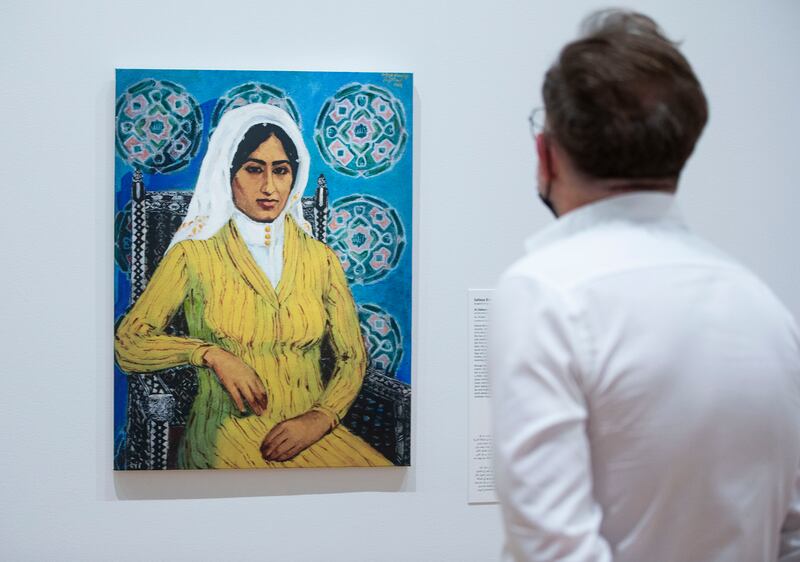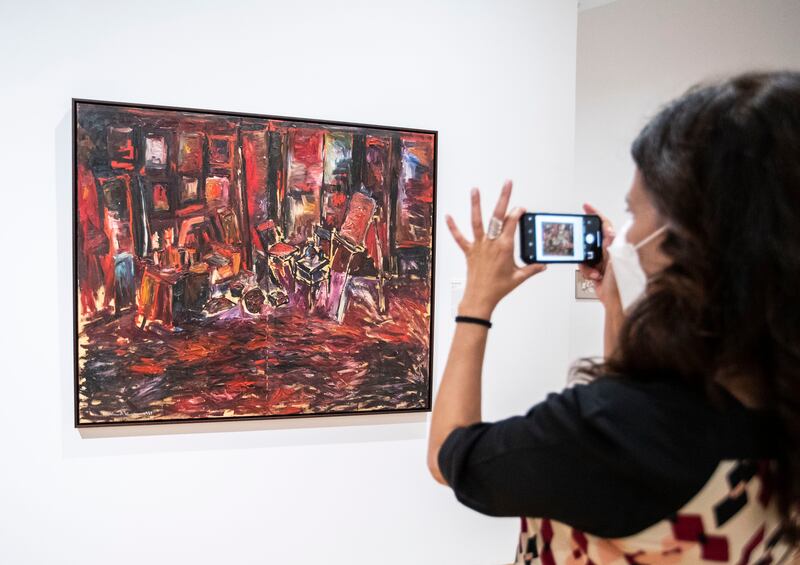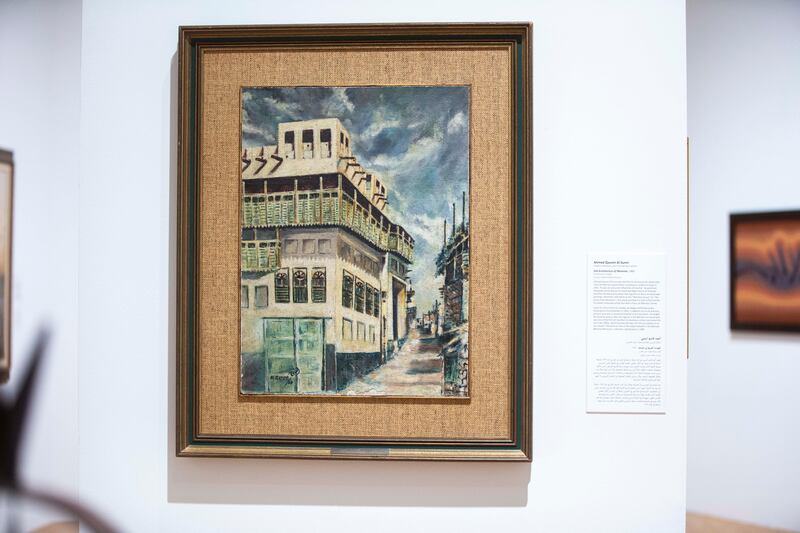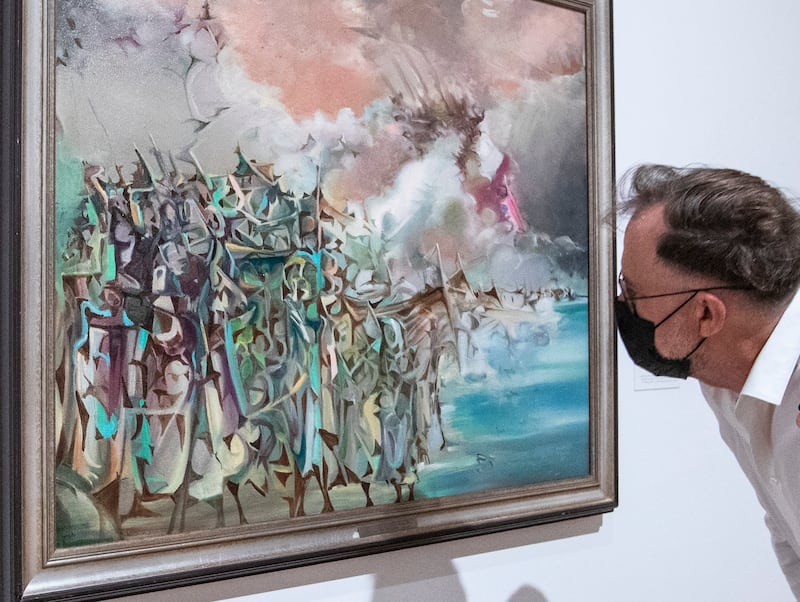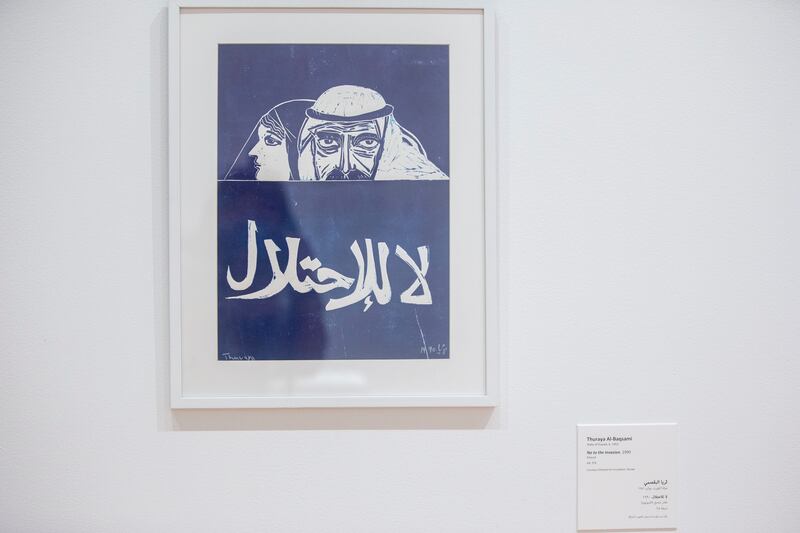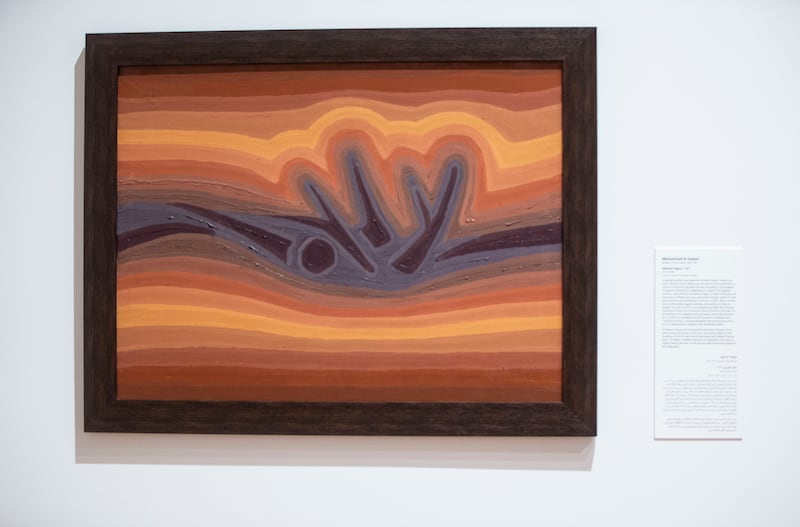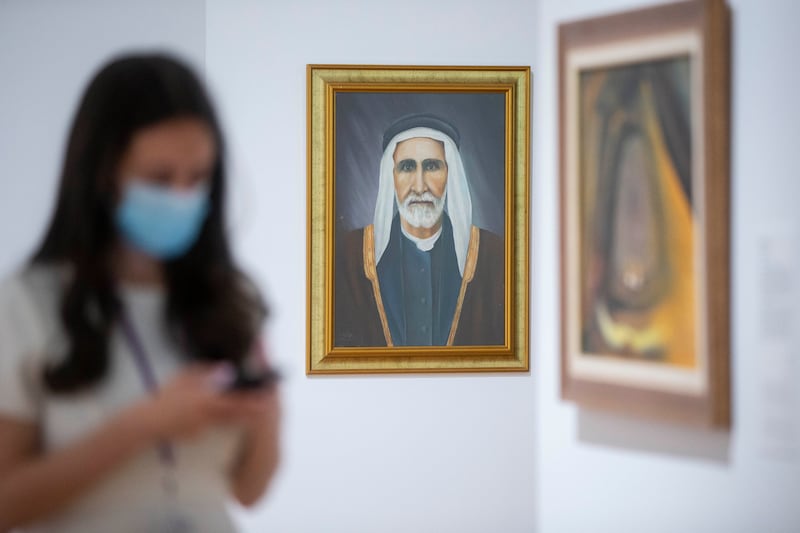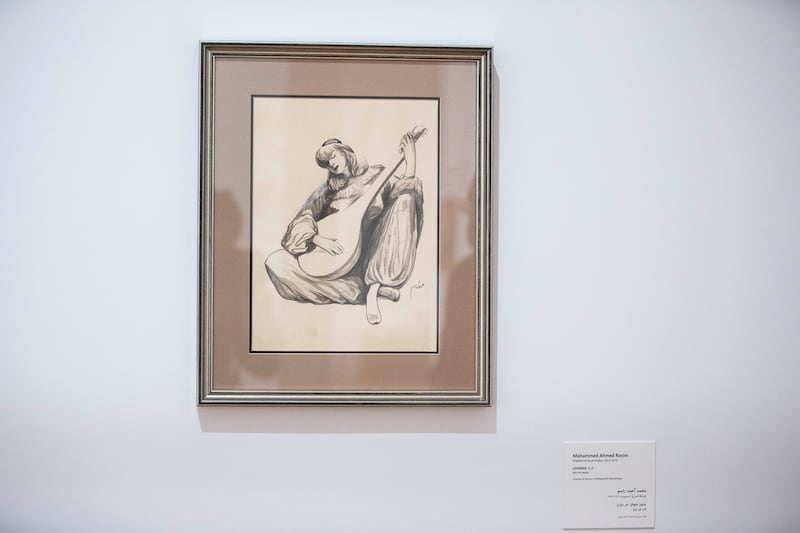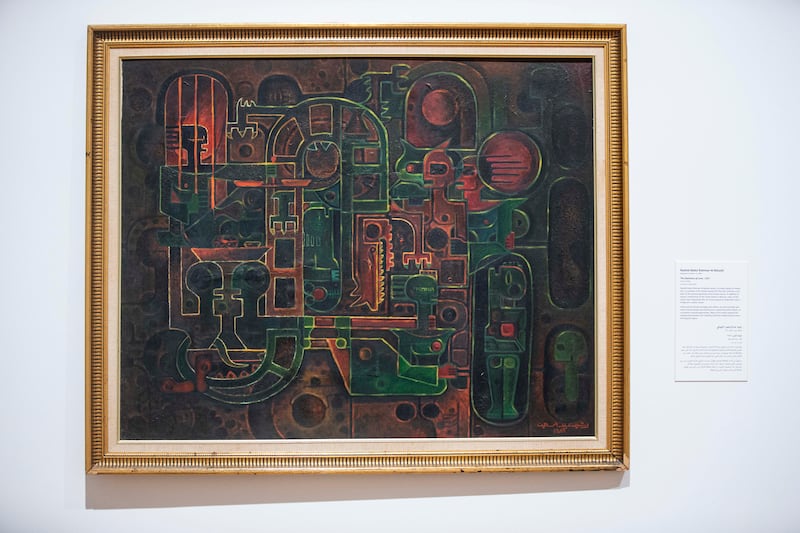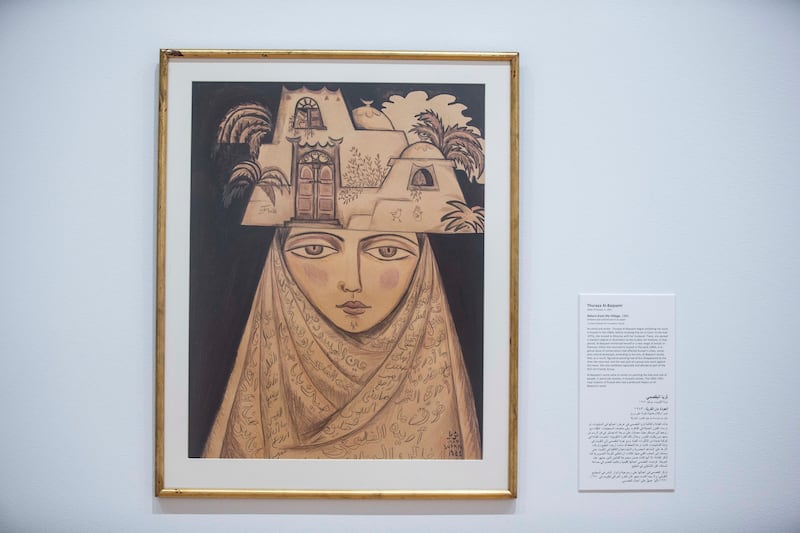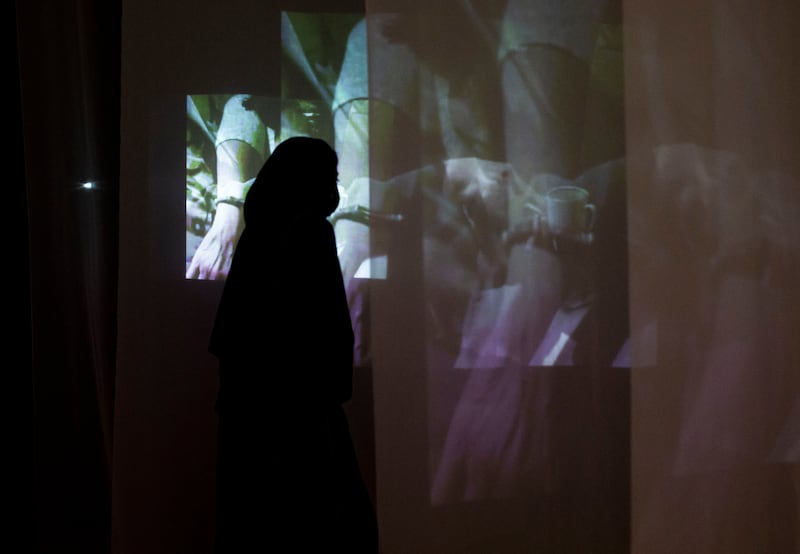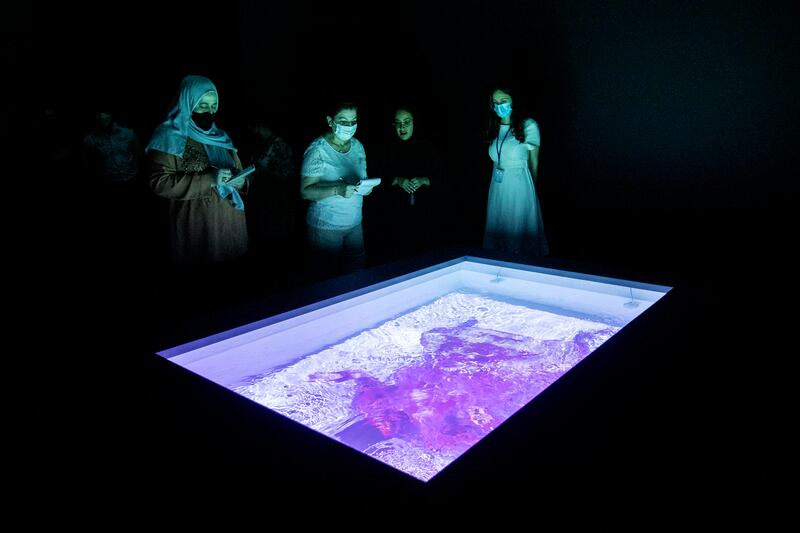The Study Room at Abu Dhabi’s Cultural Foundation is filled with art, wonder and laughter.
Across the room, tables are adorned with a colourful array of artworks, each carefully crafted over small square canvases. Between them, palettes and plates alike are covered in vast gradients of paint, interspersed with torn-up tissues of all colours, patterned paper, paint brushes and pens.
At one end, Sorbonne University Abu Dhabi students gather around a table, studying a series of masterpieces by Najat Makki. At the other, the pioneering Emirati artist herself talks them through her process.
They include selections from her Daily Diaries series — part of the Guggenheim Abu Dhabi collection — capturing snapshots of her inner and outer worlds every day; moods, visions, experiences and environments are all funneled into beautiful abstract creations.
“The Daily Diaries series is a framework that embraces every human being; it’s about capturing a moment in time — whether it’s good, or bad,” Makki tells The National.
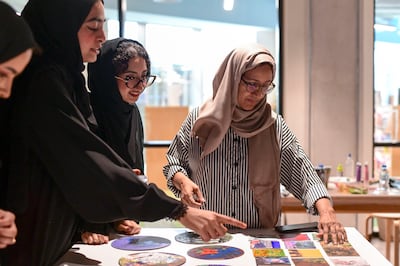
“Your day is a journey and even the simplest things like waking up and having breakfast, or washing your face, every one of those steps can evoke certain ideas. Any change or shift in oneself can create something new.”
Makki explains Daily Diaries takes inspiration from everything around her, from people and places to nature itself. “The birds, the wind, a change of weather, they’re all very important, they can all lead to new ideas,” she says.
The first Emirati woman to receive a PhD in art, Makki was part of a pioneering generation of Emirati artists. She studied in Cairo and trained in sculpture, before turning her focus to painting. Her work was recently included in NYUAD Art Gallery's Khaleej Modern exhibition, documenting the rise of contemporary art in the Arabian Peninsula.
She expresses herself through a wide array of aesthetics; changes of colour, textures and collages. Images shift dramatically from dark to light, and vast waves of emotions overlap through rich layers of paint; with leftover material gathered and reused later.
Makki's work not only displays a varied range of techniques, as bursts of inspiration flash through from moment to moment, but a dynamic blend of styles exploring landscapes, folklore and Emirati culture through realism and abstract expressionism.
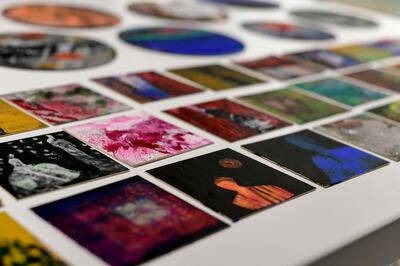
After exploring her work, the students disperse to produce their own creations, with Makki following closely behind, observing their work and answering questions. One student creates an abstraction of her grandmother through a combination of paper and fabric; another draws a wave reminiscent of Japanese artist Hokusai.
Fatma Almheiri, an Emirati history of arts student in her first year, holds her own piece, which is a recreation of a dream she had the night before, produced using coloured tissue with splashes of paint.
“I had this dream last night; there was this with fireworks going off overhead,” she says. “I find it so interesting how Najat has interpreted other mediums into her art pieces, and that inspired my own. I usually work with oil paint or acrylic.
“With the workshop, I love how everything is abstract, I love that everyone has a chance to do whatever they want. There’s no right or wrong way to do it — you just need to express yourself."
Meanwhile, Kahl Halabi, a Lebanese master’s student and freelance graphic designer, displays an original process, creating intricate patterns using characters of the alphabet in ink.
“You’re not supposed to know what the words are,” he says. “For this piece, I actually took a piece of paper with printed words on it and cut up some letters from the alphabet, assembled all the pieces and tried to come up with words that are unreadable.”
The main lesson he takes away from Makki’s workshop is simple. “Art has no rules. And, I believe that everyone is an artist,” he says.
The workshop is a rare treat for the students; many of whom have never had the opportunity to experience a hands-on class like this — owing to the disruption caused by the Covid-19 pandemic — let alone one with an artist of Makki’s calibre.
Organised by Guggenheim Abu Dhabi, the workshops continue for another two days, with another held for Zayed University students and a final session with 10 people of determination, who are students at a Ministry of Education institution. Makki works closely with the Emirates Down Syndrome Association and Sharjah's Al Falaj centre, hosting regular workshops with people of determination.
Maisa Al Qassimi, Guggenheim Abu Dhabi’s acting project director, says the museum has been developing educational engagements like the Makki collaboration since its inception. The Daily Diaries workshop series, she adds, gives students a unique opportunity to enrich their knowledge of and interest in Guggenheim Abu Dhabi, by working with one of its Emirati artists.

Al Qassimi says: “The workshop series crystallised Guggenheim Abu Dhabi’s ambition to build bridges with its future visitors and establish more dialogue on the region’s modern and contemporary art by offering a deep dive into Najat Makki’s Daily Diaries, part of the Guggenheim Abu Dhabi collection.
“Following a long period where students couldn’t physically participate in the classroom, the outreach element of this programme was essential in spearheading a return to collective learning for our youth and I was incredibly excited to welcome the next generation in what was such an engaging and hands-on experience.”
Reflecting Abu Dhabi’s unique nature as a place of inclusivity, she says: “Guggenheim Abu Dhabi seeks to continue engaging and connecting with all of its educational institutions through its civic role and mission, sparking wider interest and awareness of global modern and contemporary art in the community.”
The construction of Guggenheim Abu Dhabi, a collaboration between the Department of Culture and Tourism — Abu Dhabi and the Solomon R Guggenheim Foundation, is due to be completed by 2025.
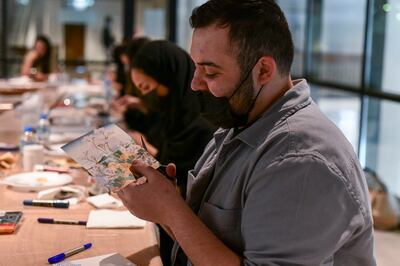
Rose Demir, associate director of education and community engagement for the Guggenheim Museum in New York, says Makki's workshop ties in with the museum’s mission to educate people, engage the community and “build connections”.
“There’s this real interest in understanding her process," she says.
“We’ve often brought artists here from our collection to talk about their work and their process, but to have the real engagement, and the real hands-on interaction, takes it to the next level,” she adds.
Although most of the Sorbonne students taking part are studying art history and archaeology, Claude Habib, who has been an art tutor at the university for 12 years, says every art historian should have some knowledge of practical art.
“I believe they should go together," says Habib. "I always tell my students not to judge an artwork — if you don't understand it, look into the artist themselves; you have to understand the philosophy behind it, you can’t just judge it from how it looks.”
She says Makki’s Diaries is a perfect study for students. “Dr Najat explained how she works on her diaries; they contain lots of memories and emotions. The workshop is about how you can implement this using acrylic or simple materials that you have at home; how to create art from our daily lives. I’m so happy they’ve been able to experience this.”
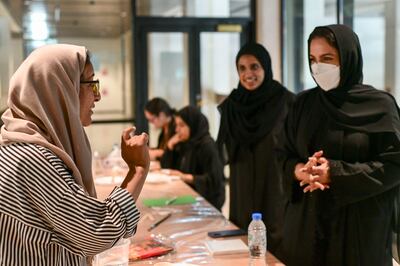
However, equally gracious and inquisitive, Makki says she gains as much from the process as her students: “My practice also benefits from their ideas; it’s a two-way process, an exchange of ideas, feelings and emotions from many different cultures."
The artist recently completed similar workshops in Albania and Tunisia, and is set to host another soon in Morocco. “Art is so important,” she says. “It can shift a perspective of an entire community.”
She adds: “Words are spoken, and then they disappear. But once you look at a painting, if it resonates with you, then it will stay with you forever — it will always keep you thinking.
“Picasso’s Guernica was so powerful, it resonated for decades and generations. So much so that it had the red carpet rolled out for its entrance,” she adds, with a touch of humour.
Yet contemporary art can bring those conversations into people’s homes, in a more subdued way, she says.
It is this subtlety that is central to her work. Female forms are presented in a variety of unexpected, and beautifully profound, ways.
“The working woman, the mother, she is a deep ocean, a representation of a woman that gives without borders," she says. "In my paintings, when I paint a tree that has a shadow, it represents a woman, because women are always giving, protecting others beneath their shade.”
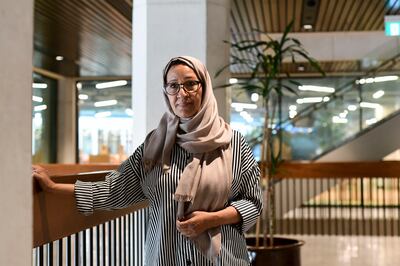
Makki encourages young artists to produce work that explores equally serious themes, in subtle, yet contemporary, ways. “Young Emirati artists are having a real moment; where everything is accessible and space is no limit,” she says.
“Thirty or 40 years ago, if we wanted to see a famous artwork, we had to travel.” However, even then, she says the UAE offered emerging artists unique opportunities through scholarships and group exhibitions abroad.
“Now, with this generation, everything is available at their doorstep; whether it’s through publications, exhibitions or museums, the knowledge, the history, the schools are there," she says.
“If you want to do a deep dive on any artist throughout history, it’s accessible. Our generation had to go out and do this on the ground because there was nothing really here. So the new generation should work especially hard. They have to be serious.
“If someone starts out thinking: ‘I’m going to be famous’, that’s not the right way, and they won’t achieve anything. It’s about honesty, commitment, setting milestones and achieving small goals to reach a bigger goal.”
Scroll through images of NYUAD Art Gallery's Khaleej Modern exhibition, which includes Makki's work, below
